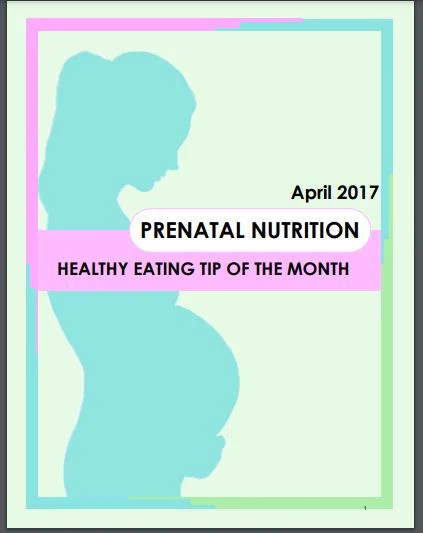‘Prenatal Nutrition Healthy Eating Tip’ PDF Quick download link is given at the bottom of this article. You can see the PDF demo, size of the PDF, page numbers, and direct download Free PDF of ‘Prenatal Nutrition Healthy Eating Tip’ using the download button.
Prenatal Nutrition Healthy Eating Tips PDF Free Download

Prenatal Nutrition Healthy Eating Tip
HEALTHY MOM, HEALTHY BABY
During pregnancy, your eating habits affect your baby.
Your baby depends on good nutrition for growth & development. Making healthy food choices and having a balanced diet during pregnancy will help prepare your baby for lifelong health!
How many extra calories do I need? It is actually a myth that you need to “eat for two” during pregnancy.
You do need extra calories, but a gradual increase in calories as your baby develops will be just right! Daily calories should be around 2,200-2,500 calories/day.
These extra calories should come from nutritious foods, such as lean meats, low-fat dairy products, fruits, vegetables, & whole grains.
How much weight should I expect to gain?
Weight gain during pregnancy is important for the development and growth of your baby, placenta, amniotic fluid, uterus, breasts, blood supply, and fat stores.
Normal weight gain is between 0-4 pounds during the first trimester and 1 pound per week during the second & third trimesters.
Remember pregnancy is not the right time to diet or lose weight as it could prevent your baby from getting essential nutrients.
ESSENTIAL NUTRIENTS
PROTEIN
Protein helps your baby’s tissue develop and also develops & repairs breast and uterine tissue, muscles, and blood during pregnancy.
DHA
DHA is needed for your baby’s brain development and growth. It also helps you stay pregnant long enough.
VITAMIN C
Vitamin C is needed for wound healing and helps develop your baby’s teeth and bones.
FAT
Fat gives energy and helps make your baby’s organs & placenta. Poly-unsaturated fatty acids (PUFAs) help with your baby’s brain, nervous system, and retina development.
CALCIUM
Calcium helps develop your baby’s bones, teeth, muscles, heart and nerve function. It is also needed for fluid control.
IODINE
Iodine helps develop your baby’s brain and nervous system. Enough iodine will help your baby move, think, and feel.
IRON
Iron makes hemoglobin, a protein in red blood cells that brings oxygen to your tissues. The amount of blood in your body increases during pregnancy, so iron is needed to make your baby’s blood supply
FOLIC ACID
Folic acid is needed for your baby’s brain and spine. Folic acid also helps make blood during pregnancy. Enough folic acid is important in preventing neural tube defects (NTD), a major birth defect of baby’s brain or spine. 70% of all NTD can be avoided with enough folic acid.
Daily Nutrient Requirements
Protein 75-100 g/day
Folic Acid 60 mcg/day
Iron 27 mg/day
Calcium 1000 mg/day
Vitamin D 600 IU/day
Vitamin C 85 mg/day
Iodine 220 mcg/day
DHA 200 mg/day
COMMON FOOD SOURCES
Protein Lean meat, fish, eggs, dairy, legumes, nuts, seeds Folic Acid Green leafy vegetables, avocado, legumes, lentils, beans, orange juice, fortified bread and cereal Iron Lean meat, seafood, clams, beef, cereal, bread, pasta, leafy green vegetables, beans, nuts, dried fruits Calcium Milk, cheese, yogurt, broccoli, kale, tofu, nuts Vitamin D Salmon, mackerel, tuna, mushrooms, eggs, vitamin D fortified milk and cereal Vitamin C Fruits, vegetables, especially red and yellow peppers, broccoli, cabbage, strawberries, brussel sprouts, citrus Iodine Fish, milk, cheese, yogurt, iodized salt, fortified cereal and bread DHA Herring, salmon, trout, halibut, DHA fortified orange juice, milk, and eggs Fat Sources of PUFAs: oily fish like salmon, trout, and herring, nuts, seeds, flaxseed, vegetable oil
Should I still take a prenatal vitamin if I eat these foods?
Even if you eat a balanced diet, you can still miss out on essential nutrients.
A prenatal vitamin, ideally started 3 months before you get pregnant, is recommended to make sure you get all the nutrients needed for a healthy pregnancy.
Some medical professionals recommend women still take prenatal vitamins while breastfeeding.
FOOD CRAVINGS & AVERSIONS
Why do I have food cravings & how do I manage them? The specific cause of food cravings during pregnancy is not known.
However, research suggests they may be related to hormones during pregnancy.
This can make you more sensitive to smells and tastes, which can cause cravings. It’s okay to satisfy your cravings as long as you are eating safe food in small amounts!
PICA
If you are craving substances such as ice, clay, wax, laundry detergent, dirt, toothpaste, soap, coffee grounds, baby powder, chalk, or cotton balls etc., this is called Pica. Pica can be a sign of iron or calcium deficiency and should be addressed promptly by your doctor.
| Language | English |
| No. of Pages | 9 |
| PDF Size | 0.2 MB |
| Category | Health |
| Source/Credits | med.umich.edu |
Prenatal Nutrition Healthy Eating Tip PDF Free Download
